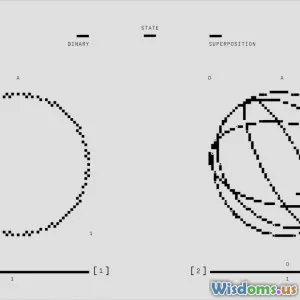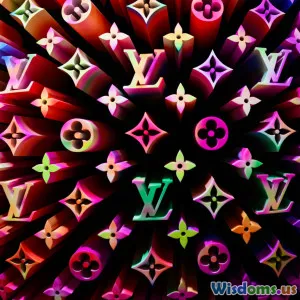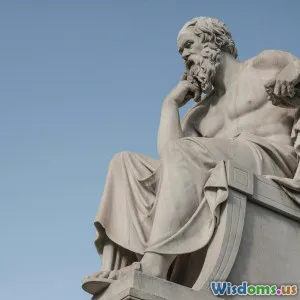
Challenging the Perception of Reality: Quantum vs. Spiritual
8 min read Explore how quantum physics and spirituality challenge our understanding of reality with profound insights and compelling examples. (0 Reviews)
Challenging the Perception of Reality: Quantum vs. Spiritual
Introduction
What if the reality we experience daily is just a fraction of what truly exists? Our perception of reality is often anchored in sensory input and cultural conditioning, but fields like quantum physics and spirituality urge us to question this foundation. Both disciplines challenge traditional notions, offering unique perspectives on the nature of existence, consciousness, and the fabric of reality itself.
In this article, we will explore how quantum physics and spirituality confront the boundaries of our understanding of reality, examine their intersections and divergences, and reflect on the implications these challenges have for philosophy and human experience.
The Quantum Revolution: Redefining Physical Reality
The Foundations of Quantum Mechanics
Quantum physics emerged in the early 20th century, revolutionizing classical mechanics by uncovering phenomena that defy intuitive understanding. Concepts such as wave-particle duality, superposition, and entanglement describe how particles behave in ways inconsistent with traditional physics.
For instance, consider the famous double-slit experiment: particles like electrons create interference patterns characteristic of waves when unobserved but behave like discrete particles upon measurement. This implies that observation itself affects the nature of reality.
Moreover, quantum entanglement shows that particles become deeply linked, such that the state of one instantaneously affects the other, regardless of the distance separating them—a phenomenon Einstein called "spooky action at a distance."
These experiments challenge the idea of an objective, observer-independent reality and instead hint at a reality interwoven with the act of observation.
Implications for Reality
Quantum physics suggests that the classical notion of a fixed, deterministic universe is incomplete. Reality at its quantum level is probabilistic and fundamentally interconnected. Nobel laureate physicist Richard Feynman once remarked, "I think I can safely say that nobody understands quantum mechanics," underscoring the field’s enigmatic nature.
The concept of non-locality (instantaneous connections across space) unsettles classical space-time paradigms, inviting questions about the true structure of reality. Could information and consciousness play fundamental roles in shaping how reality manifests?
Spiritual Perspectives: Reality Beyond the Physical
The Core of Spiritual Philosophies
Spiritual traditions across cultures emphasize that reality transcends empirical experience. For example, Hinduism’s Maya articulates that the physical world is an illusion masking a singular, eternal truth (Brahman). Similarly, Buddhism teaches the impermanence and illusory nature of the self and phenomena.
Mystics often describe experiences of interconnectedness, unity, and transcendence that disrupt the sense of a separate, material self. These experiences suggest a reality built not solely on physical matter but on consciousness or spirit.
Consciousness as the Ground of Reality
Many spiritual philosophies propose consciousness as the foundational element of reality — a position echoed in modern discussions on panpsychism and idealism.
The subjective experience of consciousness, with its qualities of awareness and intentionality, remains an enigma in the physicalist worldview. Renowned psychologist William James reflected on this mystery: "Consciousness is the one thing the world cannot do without."
Practices like meditation reveal that altering consciousness can change perception radically, reinforcing spirituality's claim that reality is not merely an external object but involves internal states and awareness.
Bridging the Gap: Quantum Mysticism and Philosophical Dialogues
Where Quantum Physics Meets Spirituality
Some thinkers propose that quantum phenomena resonate with spiritual teachings. Physicist Fritjof Capra, in his seminal work The Tao of Physics (1975), highlights parallels between quantum mechanics and Eastern mysticism, emphasizing interconnectedness and the limitations of dualistic thinking.
For example, the collapse of the quantum wavefunction upon observation has been metaphorically aligned with the role of consciousness in actualizing potential realities. Though scientifically contentious, these parallels stimulate intriguing conversations.
Critical Perspectives and Scientific Caution
However, many physicists caution against conflating spiritual concepts with quantum mechanics—a phenomenon sometimes dubbed quantum mysticism. Skeptics argue that spiritual interpretations often oversimplify or misrepresent quantum theory to fit metaphysical agendas.
Physicist Sean Carroll asserts, "Quantum mechanics doesn’t say reality is just a dream or consciousness creates the universe," reminding us to approach these dialogues discerningly. The challenge lies in appreciating the mystery without compromising scientific rigor.
Real-World Insights: Implications for Personal and Collective Reality
Transforming Worldviews
Understanding the quantum and spiritual challenges to reality can reshape how individuals relate to themselves, others, and the universe. This can foster humility, openness to mystery, and a sense of interconnectedness, which are valuable in a fragmenting world.
Numerous studies in psychology demonstrate that practices rooted in spiritual traditions—like mindfulness and meditation—promote well-being, emotional resilience, and ethical behavior, potentially linked to broadening one’s perception of reality.
The Frontier of Consciousness Studies
Interdisciplinary efforts—from physics to neuroscience to philosophy—are increasingly dedicated to studying consciousness and its role in reality. Experiments in quantum cognition explore whether quantum principles apply to mental processes, indicating a frontier where empirical research meets perennial questions.
Conclusion
Challenging our perception of reality through the lenses of quantum physics and spirituality invites us into a profound enquiry that transcends disciplinary boundaries. While quantum physics reveals a subatomic world where observation and connectivity rewrite traditional rules, spirituality offers timeless insights into consciousness and the nature of existence.
Together, they urge a more nuanced and humble understanding of reality—one that appreciates mystery, complexity, and the intrinsic link between observer and observed. Embracing this can cultivate a richer sense of self and world, inspiring transformative perspectives on life and the cosmos.
As science advances and spirituality continues its inward exploration, the dialogue between these realms promises to deepen our grasp of what is real—and what lies beyond.
References:
- Fritjof Capra, The Tao of Physics, 1975
- Richard Feynman, The Feynman Lectures on Physics
- William James, The Principles of Psychology, 1890
- Sean Carroll, The Big Picture, 2016
- Studies on mindfulness and well-being (American Psychological Association, 2019)
Author’s note: Exploring such profound topics involves ongoing inquiry and personal reflection. Readers are encouraged to delve into original texts and scientific research for deeper understanding.
Rate the Post
User Reviews
Other posts in Philosophy of Mind
Popular Posts
















